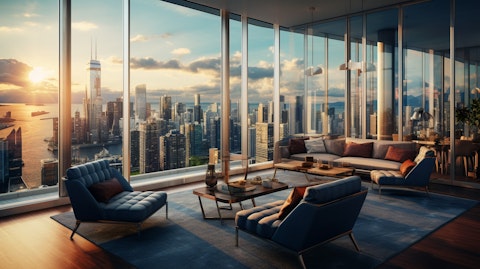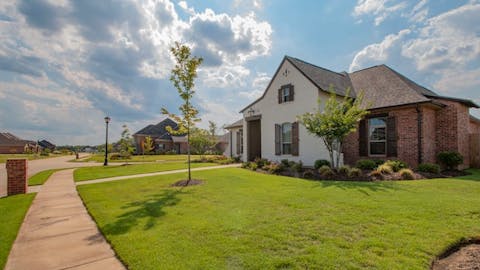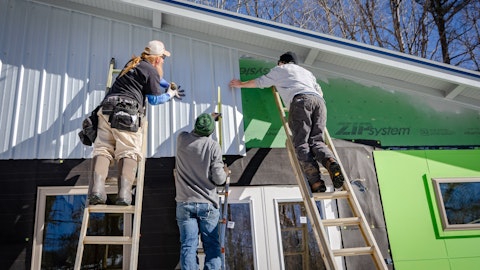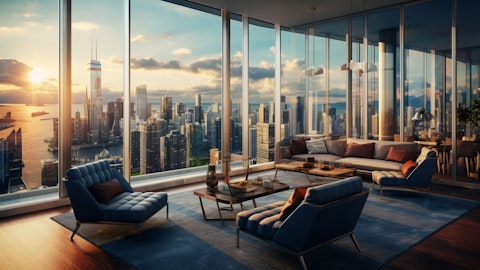IRSA Inversiones y Representaciones Sociedad Anónima (NYSE:IRS) Q3 2024 Earnings Call Transcript May 8, 2024
IRSA Inversiones y Representaciones Sociedad Anónima isn’t one of the 30 most popular stocks among hedge funds at the end of the third quarter (see the details here).
Matias Ivan Gaivironsky: So good morning, everybody. Today, we will review the results of our Nine Months Period of our Fiscal Year 2024. This was a special quarter with a big change on the political side, with the assumption of the new administration, a big change also on the economic side, with the first measures of the new administration that tend to stabilize the economy, reduce the deficit, reduce the inflation. So, so far, there were good results. This is too early to see results on our industry. But we have a strong hope in the new administration and to obtain and achieve an stabilization of the economy that will be very good for our industry. When we review the results of the nine month period, we will see a loss on the net income of around ARS111 billion, that is explained mainly with a noncash effect on the fair value of investment properties that I will explain later.
Also, we see good results when we see the adjusted EBITDA with a 9% increase against the same period of the last year. During the quarter, there was a slowdown in consumption and our EBITDA, mainly in the malls, decreased compared with the same period of the last year, that also we will review later. Regarding tenant sales, there was a slowdown in consumption. So we will see a drop. Occupancy are at very good levels, both in malls and in offices. On the financial side, we decided to launch a new buyback program. So, so far, we acquired around 1.7% of our own stock. And also 10 days ago, we decided to pay a new dividend that we will start the distribution tomorrow for our local shareholders. The dividend is for ARS55 billion. So now I will turn the call with Santiago Donato, our IRO.

Santiago Donato: Thank you, Matias. Well, here, we can see the shopping malls operating figures, our tenant sales on the quarter and on the accumulated nine month period. On the quarter, as Matias mentioned, we have seen a decrease, a drop of 18.5%. This is the third quarter of 2024 compared to the third quarter of 2023 due to the acceleration of inflation and its impact on consumption during the third quarter of the fiscal year 2024. Occupancy remained very, very high at levels of 98% in our malls. And when we look at the accumulated sales, we are up almost 1% in the year compared to the same period of last year. So in the nine month period, we cover inflation. We’re a little bit above inflation, because until December, the first semester of this fiscal year was really good.
Sales were up like 10% in real terms. When we see the breakdown by type of business, we see that apparel is in the average, 19% down on the quarter. Services and miscellaneous are a little bit up as [hoped] on the distribution. And then restaurant, home and electronics and entertainment are a little bit even at levels of 25% to 30% decrease on the quarter. The next quarter is going to be a challenge as well to sustain tenant sales and activity and visitor flows in the malls. But we trust that in fiscal year 2025 that starts in July ’25, activity in the malls should recover in line with the recomposition of salaries and the economic activity. Regarding the office segment, after selling assets during the last three, four years, we currently manage about 59,000 square meters, mostly A plus and A buildings, that when you see occupancy remains very high at levels of 93%, this is above the average of the industry in Buenos Aires, while rents remain stable at levels of $26 per square meter per month.
And finally, on the third rental segment on the hotels. The three hotels have shown very good performance during the quarter, reaching on average almost 69% occupancy and a rate per room of almost $260. Buenos Aires hotels, the ones that we own here in Buenos Aires, the Libertador and the InterContinental, recovered strongly in occupancy and rates due to the recovery of the corporate events and the increase of tourism. And [indiscernible] that reached peak of occupancy of 83% last year, now it’s still in very high levels, at levels of 76% occupancy and it’s charging rates of — are approximately $470 per room. So despite the shopping centers that have showed a drop this quarter, in general terms, the rental segment is doing very well and closing the year in a good — with a good performance.
See also 15 Best Places to Retire in Louisiana and 10 Undervalued Stocks with Latest Insider Purchases.
Q&A Session
Follow I R S A Inversiones Y Rep S A (NYSE:IRS)
Follow I R S A Inversiones Y Rep S A (NYSE:IRS)
Receive real-time insider trading and news alerts
I will now turn to Jorge Cruces. Jorge is the CIO of the company, to show the status of the upcoming projects of the company.
Jorge Cruces: Thank you, Santiago. Good morning, everybody. Costa Urbana, regarding the project for the infrastructures, we have completed the submittal of all additional information and documents requested by City Hall for granting the approval of the project for the infrastructures and road works. In respect of public park project, our design team is working with the City Hall on the architectural and landscape of the public park on all three phases. As for the environmental approval, having completed the submittal of all assessments requested by environmental authorities, we expect environmental public hearing to be held in June or July. La Plata development project. The land is a huge block of about 8 hectares in the north down of La Plata City.
In their surroundings, there’s two supermarkets and a home center, becoming by far the most important supply center of the city. It’s a mixed use master plan. The huge block has been subdivided into 18 lots, two of them becoming public squares to be transferred to the city, the largest one for shopping center and the other plots for developing residential and commercial buildings. The shopping center will be a two level open air and will have 22,000 square meters of gross leasable area and 720 parking spaces. The residential and commercial buildings will have approximately 78,000 salable square meters. Today’s status. The town council has approved the project and issued the construction permit. In April, industrial survey plan and proposal for creating the new plots was filed and registered, enabling the lots to be sold.
Project and bidding documents already completed and ready for tender process. The La Plata Building. Late December, Banco Hipotecario, in its capacity as owner and truster of the land, transferred the fiduciary domain of the property in favor of TMF Trust Company as trustee. In January, City Hall approved the construction license for the project, allowing us to start the construction works. The first meeting of the Trust Executive Committee has been held in March and authorities were designated. And most importantly, a closure regarding the final list of money transfers and the percentage of participation of the investment. Nowadays, the architects are working on the final technical augmentation, which is expected to be finished by June. In the meantime, we are signing the contract with the construction manager and beginning some minor demolitions.
Big numbers of the development. Total surface area of 60,000 square meters, salable square meters of 35,000, 15 floors and four parking floors in the basements, 721 apartments, eight shops 224 parking lots. Last but not least, these last couple of weeks, there’s been a game changer. Mortgages. Just in the last couple of weeks, some banks actually — Banco Hipotecario was the first bank to announce it, but now there’s been like five banks announcing that they’re going to start with mortgages these next couple of months. This is a game changer for us, not only because of our stake of 30% in Banco Hipotecario but it’s a game changer regarding all our projects that we have in our portfolio. We’re really anxious to see how this plays out, but we’re confident that it’s going to be very important for the next two or three years for the company.
Now I’ll give back the floor to Matias, our CFO.
Matias Ivan Gaivironsky: Thank you, Jorge. And to reinforce the idea of how the mortgage industry can change real estate, we have to mention that Argentina is an economy with no leverage. Mortgages to GDP in Argentina is only 0.3%. When you compare that with our neighbor countries, that number is much, much higher. So we believe that if this — the economy stabilize and we will start to have this kind of offer on the mortgage side, this will be a very big change for our real estate industry. So to enter in the financial results, I would like to spend 30 seconds saying what happened with the main variables, the FX and inflation. As you remember, there was a big devaluation in December. We discussed that in the last conference call, the official FX went from 350 to 800.
And then during this quarter, the FX remain stable. You know that the government is implementing a crawl impact of 2% per month, they maintained that during the last three months and also during April. So that generates volatility in our results. We have to put all the numbers in peso terms adjusted by inflation. So this kind of movement — big movements really generate volatility in the results. You know that on the asset side, we value the malls at the official exchange rate, a fair value at the official exchange rate. And then in the land bank and office portfolio, we are valuing at the blue chip swap at the dollar [MEP], that also was stable during the quarter. The last quarter, we finished with 995 and now with 117. So when we see numbers adjusted by inflation, you will see that on the bottom left, the official exchange rate that closed at 858, equivalent in December was 1,225.
And then the blue chip swap was 1,800 in the third quarter and we finished at 1,017 in March. So we will see the impact on that in the following pages. First, on the adjusted EBITDA, we still have good numbers. The adjusted EBITDA increased by 6%, the rental EBITDA by 12%. So remember that we finished December with better numbers. And then in this last three months period, for instance, the mall EBITDA decreased by 18% compared with the same period of the last year. This is when we compare numbers in pesos term. Probably going forward, we won’t see results in pesos term. But if the dollars remain stable, maybe we’ll see good numbers in dollar terms but lower numbers in pesos terms. When we see the margins, margins remain stable, shopping malls at levels of 76%, offices at 81% and hotels at 40%.
So in the following page, so leaving aside the effect of the change in the fair value numbers were good. Operating income increasing by 40%. But then when we see the loss generated by the change value in the investment properties, there was an important loss of ARS385 billion. So that — basically the effect is what I described at the beginning, that is the effect of the FX and the inflation. If we see the numbers in dollar terms, our malls remain at the same value. The office is at the same value and the land bank at the same value. So no major changes. It’s only the effect of posting the results in pesos term. The next page, we see the net financial results. Here, we have good numbers. There was an important result from the fair value of our assets.
There was the liquidity invested in securities, that was a good result. And also the impact of the devaluation that you see again in the nine month period of ARS81 billion, that is the appreciation of the pesos against the devaluation. Regarding the income tax. Here we post again, it’s weird to see a gain in the income tax, but this is the gain related to every time that we post a loss in the fair value of the [investment] properties, we post a gain in the deferred tax. And if we post a gain, we will post a loss on the deferred tax that we could pay if we sell the property. Something important to mention is that probably during the last years, we consume the tax credit that we had. So probably starting this year, we will start to pay income tax again.
So finally, the net results. As I mentioned at the beginning, there was a loss of ARS111 billion compared with a gain last year of 123 billion. Moving to the next page, the evolution of our rental EBITDA in dollar terms during the last year we see very good numbers. The last 12 months in dollar terms was $161 million, is a slight decrease compared with the previous year, but a very important increase when we compare with pre-pandemic levels. Regarding our debt, there was two new issuances in the local capital market during the quarter. We issued around $52 million in true tranches, one in dollar terms at 7% coupon and the other in pesos Class 1 that we raised is around ARS31 billion. Total gross debt today is around 357 million as of this March — it’s $357 million and is diversified in the following years and not concentrated in any specific year.
The next page is, as I said, we’ve announced a new dividend that we will start to pay tomorrow, is ARS55 billion, around ARS76 per share or ARS761 per ADR is a dividend yield of 7%, that is dividend together with the previous dividend that we distributed in October, reaching amount of almost $120 million of dividends. So this is an extraordinary dividend. We feel comfortable with our financial situation and liquidity and the low leverage. So we decided to be more aggressive on the dividend. Regarding the ADR holders, we don’t expect a delay like in the last one. So we expect to fix a record date for the ADRs probably in the next 10 days. So we expect that our ADR holders will collect in dollars the dividend soon. This will be using the blue chip swap FX and not at the official FX.
So in the following page, we see the evolution of the debt. Also on a pro forma basis, including the dividend distribution, we will be in levels very conservative for debt. So we feel very comfortable with these numbers. About the shares repurchase programs. As you know, we launched two programs, one that we finished in March and the second one we finished in April. So together, we acquired around 1.7% of the shares. And together with the last program that we acquired a year ago, we have in treasury around 2.2% of the shares. So with this, we finished the formal presentation. Now we open the line to receive your questions.
A – Santiago Donato: Well, now is the time for the Q&A session. If you have a question, you can use the chat, we will take the questions in the order we receive them. Well, here, we have a further first question, which is the time line — the timing expected for the Costa Urbana project? You can give some color on the timing.
Jorge Cruces: The timing is, as I said before, we need the environmental hearing that should be in June, July. And from then, we can start the construction. So as we start the construction, we’re going to start selling the lands. We need to start infrastructure to start selling the land. So I suppose that in the second semester of this year, all that’s going to happen. We’re going to start with the works and we’re going to start with all the commercial and the other plans. And maybe even starting a building of our own maybe in the next semester in the next year, first semester of ’25.
Matias Ivan Gaivironsky: Also, Jorge, it’s important to mention that the environmental hearing is not binding. So we don’t need that to start the project [Multiple Speakers] it’s one step more, but it is…
Jorge Cruces: It is, but you need that approval. You need to do it first before construction. So after the hearing, we can start construction.
Santiago Donato: Thank you, Jorge. The next question coming from [balance]. What are your expectations for the office segment in fiscal year ’25? Do you plan to continue divesting from the office segment? And there is another one where your expectations for maintenance and expansion CapEx for the last quarter of fiscal year ’24 and fiscal year ’25. Would any expansion efforts be allocated to your mixed use projects only?
Matias Ivan Gaivironsky: The first part regarding the office segment. About the operational side, we don’t expect a major change. Prices are stable in dollar terms. Of course, in pesos, we are receiving now something more close to the real dollars than before. Remember that the gap between the official FX and the blue chip was like 300 in December, and now it’s only 20% difference. So now we are getting much more close to real value of the dollars. And on the divesting process, as we always said, we don’t anticipate the transactions. But if we see good prices, we are not just accumulators of square meters. So if we see good opportunities to divest the portfolio, and we will continue to do it and probably rotate that portfolio in a new one in the future.
So we are open and is part of our strategy to rotate the portfolio. And regarding the expectations of maintenance CapEx and the expansion for the next year, it’s not a significant CapEx so far what we announced it. So we will deploy around $40 million in the infrastructure of Costa Urbana, probably during 2025. La Plata projects will need around, I would say, no more than $10 million during 2025. And maintenance CapEx is not significant in our existing malls, so it’s probably around 2% of our EBITDA. I don’t know Jorge, if you want to add something else?
Jorge Cruces: No, I think that’s about right.
Matias Ivan Gaivironsky: And the [Edificio] Plaza, remember that IRSA is the developer and also is an investor, and we will invest around 20% of the cost of construction, but the construction will take like two or three years to develop. So it’s not a significant amount of money that what IRSA will invest in that project. This is only with what we announced. Also, we are looking for opportunities to acquire existing land bank or existing buildings. So maybe we can be more aggressive on the acquisition side. But so far, what we announced on the development side is what we described.
Santiago Donato: Next question, how long do you think it will take for tenant sales to recover? Are wages index being followed to predict this?
Matias Ivan Gaivironsky: That’s not an easy question to answer. This will depend on the evolution on the macro side. You know that with the acceleration of inflation, wages were not adjusted at the same pace. So we will need to see recovery on wages. And also something that happened in consumption that with the normalization of prices in tariff in general terms, transportation, utilities, the people will receive increases in — and government is trying to cut subsidies that will also affect consumption power of the people. So it’s tough to predict how fast the economy will recover. There is a big discussion in the — between the economies if the economy will recover a way of — or other or more slowly. But what we anticipated that what we see and we anticipated this in December, that we won’t see increase in real terms in our tenant sales at least for the next months.
And as said, we expect that started in July to start to see some recovery. But probably in pesos term, we will see weaker results. But maybe in dollar terms, we will see higher numbers because if the dollars remain stable and the inflation component on the peso side, although, we want to increase at the same pace of inflation in dollar terms, maybe we will see better results.
Santiago Donato: Yes, at the end of the year won’t close so bad, because we had a first semester of the fiscal year very strong and the second semester weak. So it compensates at an annual basis.
Matias Ivan Gaivironsky: But having said that, when we see the levels of cash generation on the EBITDA side remain very strong. And most of our agreements today adjust the CPI, although, we have some lag to adjust — one month to a adjust, or one or two months to adjust the agreement. But we have that protection that most part adjust by inflation. So that will be a protection in this kind of slowdown in consumption.
Santiago Donato: We give two minutes more. If there is any additional questions, you can use the chat. Okay. If there are no more questions, we conclude the session and we turn back to Matias for his closing remarks.
Matias Ivan Gaivironsky: Thank you very much, Santi. So as I said, we are very confident on the normalization of the economy. We believe that, that will create a lot of opportunities for IRSA to be more aggressive on the expansion. New projects, as you know, during the last three years, we were very focused in preserved liquidity and to work, and we saw much more opportunities in our own capital structure than launching new projects. But we hope to see IRSA leading the real estate industry in Argentina. So we expect to be much more aggressive in the expansion. If the new administration achieve a normalization of the economy, the cost of the capital of the company is reduced, we can be much more aggressive. You know that we have plenty of land to expand our portfolio. So we hope to see IRSA in a new stage of growth going forward. So thank you very much and see you in the next call.
Follow I R S A Inversiones Y Rep S A (NYSE:IRS)
Follow I R S A Inversiones Y Rep S A (NYSE:IRS)
Receive real-time insider trading and news alerts




